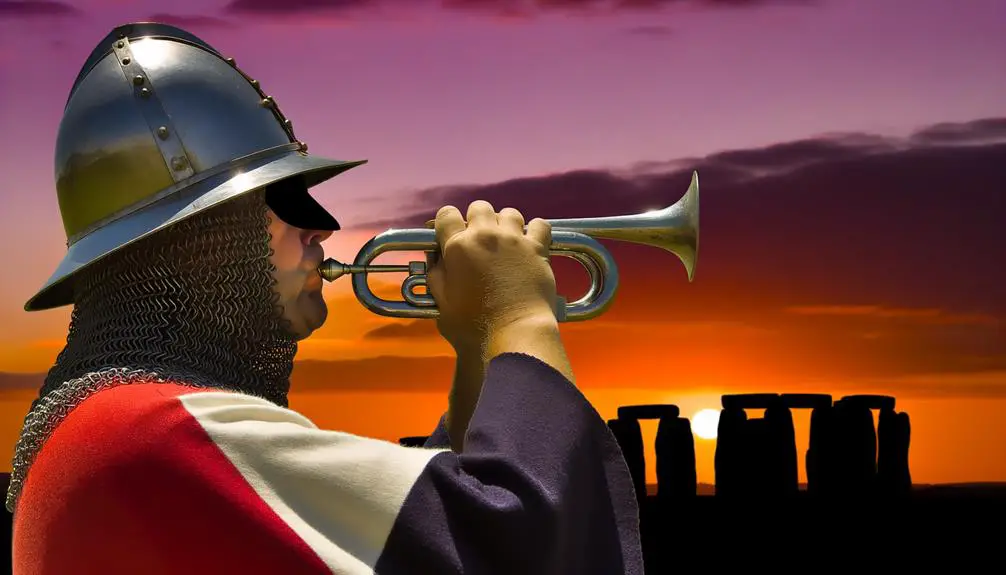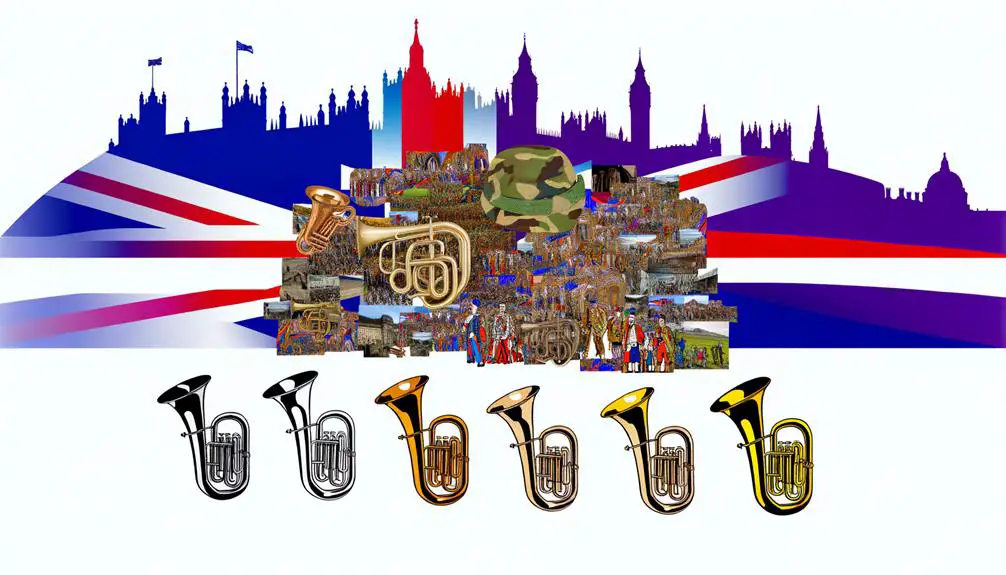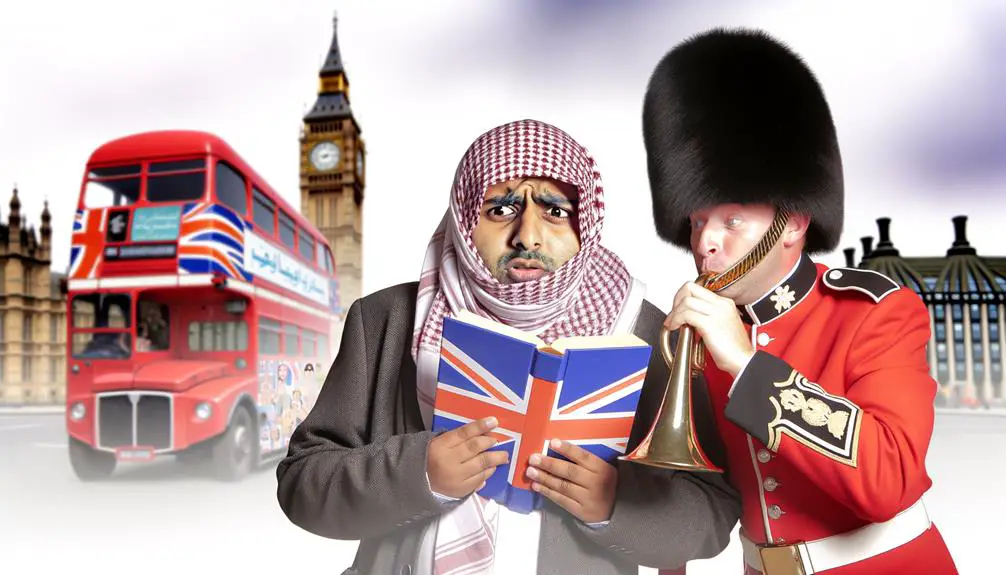In British slang, "bugle" has taken on meanings far removed from its original as a brass instrument. You might be surprised to learn it refers to both cocaine and the nose, underscoring the playful and creative evolution of language. This duality highlights the linguistic agility within subcultures, making "bugle" a term of euphemism and humor. Beyond its use to soften discussions around cocaine, it serves as a wry nod to the nose's role in its consumption. Linguistic creativity transforms "bugle" from a simple signal to a symbol rich with contemporary nuances. Unraveling these layers offers insight into the dynamic landscape of British slang.
Key Takeaways
- In British slang, 'bugle' is commonly associated with cocaine, serving as a euphemism for the drug.
- The term also humorously refers to one's nose, playing on the idea of snorting cocaine.
- 'Bugle's dual usage showcases linguistic creativity and the evolution of language within subcultures.
- Its origins as a brass military signaling instrument add a layer of irony and metaphor to its modern slang meanings.
- Understanding the context is vital, as 'bugle' can signify different things based on regional dialects and social settings in the UK.
The Origin of 'Bugle'

Tracing its origins, 'bugle' initially referred to a brass instrument used in military signaling, but in British slang, it has transformed to convey a significantly different meaning. To understand this evolution, you need to explore the instrument's history and the intricacies of its manufacturing techniques. Initially, bugles were crucial in communication across battlefields, their distinct tones cutting through the chaos to issue commands.
The creation of these instruments, a process that has been perfected over centuries, involves precise metalworking skills. Traditionally, craftsmen would hand-craft the brass, ensuring each bugle met the strict standards needed for its sound to travel accurately. This careful attention to detail in the instrument's production reflects a broader grasp of its importance beyond just musicality; it was about clarity, dependability, and the authority of sound to unite or command.
As you investigate the evolution of 'bugle' in British slang, it is crucial to appreciate the depth of its original context. The instrument's history, characterized by its roles in military and ceremonial settings, and the specific manufacturing techniques that define its sound, are fundamental to understanding how 'bugle' could change in meaning within cultural vernacular.
'Bugle' in Modern Usage
In today's British slang, 'bugle' has taken on a meaning far removed from its historical roots, representing an intriguing shift in linguistic evolution. Initially associated with musical instruments or signals, 'bugle' now intriguingly doubles as slang, especially within certain subcultures. Its modern usage mainly revolves around cocaine slang and as a nose reference, showcasing a vivid example of linguistic creativity and the dynamic nature of language.
Understanding 'bugle' in its current context requires a look at how it's employed in everyday conversation. Below is a table summarizing its dual roles in modern British slang:
| Usage Context | Meaning |
|---|---|
| Cocaine slang | Refers to cocaine, highlighting the drug's prominence in certain discussions. |
| Nose reference | Used to describe the nose, often humorously, which is a nod to the nose's role in cocaine consumption. |
| Conversational | May appear in casual conversations, indicating its assimilation into everyday language. |
| Subcultural | Particularly prevalent within certain groups, emphasizing its slang status. |
| Euphemistic | Serves as a euphemism, softening discussions around cocaine use. |
This evolution reflects broader changes in societal attitudes and conversations, marking 'bugle' as a fascinating study in slang's adaptability and cultural significance.
Variations of 'Bugle'

Exploring the nuances of 'bugle,' it's vital to acknowledge how this term varies across different contexts, showcasing its flexibility and subtle meanings in contemporary British slang. The term, rich in its adaptability, can imply more than just its surface interpretation, especially when dissecting its variations. These variations not only enrich the term's usage but also add layers of meaning that are context-dependent, reflecting the dynamic nature of language itself.
When considering 'bugle' within various contexts, three primary variations emerge:
- Metaphorical Usage: Beyond its literal meaning, 'bugle' can symbolize a call to action or attention in a metaphorical sense, embodying the spirit of rallying or gathering.
- Colloquial References: In slang, 'bugle' might refer to specific behaviors or characteristics, often with humorous or ironic undertones, further diversifying its application.
- Subcultural Language: Within certain groups, 'bugle' acquires unique connotations, serving as insider language that strengthens communal bonds.
These variations highlight the term's complexity, influenced by factors such as bugle colors and the nuances of instrument care. Such elements contribute to the richness of 'bugle' in British slang, underlining the importance of context in understanding and applying this versatile term.
Cultural Significance
As you explore the cultural significance of 'bugle' in British slang, it's pivotal to recognize its military signal roots, which have profoundly influenced its presence in everyday language. The term's adaptation for sporting event calls underscores its versatility and enduring relevance across various contexts. This linguistic journey from formal to casual usage illuminates the dynamism of language evolution within British society.
Military Signal Roots
Delving into its military signal roots, it's clear that the bugle holds significant cultural importance, serving as an essential communication tool on the battlefield. This historical instrument transcends mere communication, embodying the spirit and discipline of the military. Its use in ceremonial purposes further underscores its revered status within the armed forces.
The impact of the bugle in military operations can be summarized in three key points:
- Coordination: Facilitated troop movements and battlefield strategies.
- Morale: Boosted soldiers' spirits through the call to arms or retreat.
- Ceremony: Cemented its role in rituals, honoring the fallen and marking significant military events.
This analysis reveals the bugle's profound influence, not just as a tool for directives, but as a symbol of unity and respect within the military community.
Sporting Event Calls
Beyond its military origins, the bugle has also found a significant place in sporting events, where it's utilized to signal the start of races or to add ceremonial gravitas to the proceedings. Its sound, piercing and clear, guarantees that event logistics run smoothly, marking the beginning and sometimes the end of competitions. Audience reactions to the bugle's call are often of anticipation or excitement, recognizing it as a herald of the contest's commencement.
| Aspect | Significance |
|---|---|
| Event Logistics | Guarantees timely start and ceremonial aspects. |
| Audience Reactions | Evokes anticipation, excitement, and engagement. |
This use of the bugle, steeped in tradition, seamlessly bridges its historical military roots with the contemporary cultural fabric of sporting events, enhancing the spectator experience through auditory cues that are both functional and ceremonial.
Everyday Language Use
In the domain of everyday language, 'bugle' transcends its literal meaning, becoming a metaphor rich with cultural significance. This demonstration is a testament to the dynamic nature of language evolution, illustrating how words adapt and flourish within cultural contexts. Understanding 'bugle' in British slang requires an appreciation of its slang origins, which are deeply rooted in social interactions and historical moments.
Analyzing 'bugle' reveals:
- Its adaptability in conveying nuanced emotions or situations.
- The role of social environments in shaping its slang connotations.
- How it reflects broader changes in language use over time.
This evolution underscores the fluidity of language, where 'bugle' serves as a vivid example of how expressions morph, gaining new dimensions and enriching everyday communication.
How to Use 'Bugle' Correctly
When you're exploring the intricacies of British slang, understanding the correct usage of 'bugle' is essential. You'll need to comprehend its meaning in various contexts, familiarize yourself with common usage examples, and appreciate the subtle nuances that distinguish its slang application. This approach guarantees you're not only informed but also capable of employing 'bugle' with the precision and authenticity that native speakers expect.
Meaning in Context
To grasp the nuanced usage of 'bugle' in British slang, you'll need to understand its context and connotations within various social interactions. The evolution of slang is pivotal to how words like 'bugle' acquire layered meanings over time. In dissecting its usage, consider the following:
- Historical Context: How bugle meanings have shifted with cultural and societal changes.
- Geographical Variations: The interpretation of 'bugle' can vary greatly across different regions of the UK.
- Social Settings: Whether used in jest, as a term of endearment, or disparagingly, the setting plays an essential role.
Understanding these aspects will enable you to use 'bugle' more accurately, reflecting an informed and precise grasp of contemporary British slang.
Common Usage Examples
Understanding how 'bugle' is commonly used in British slang requires a keen observation of its application in everyday language, particularly noting the nuances that distinguish casual from formal settings. You'll find 'bugle' seamlessly integrated into conversations among friends or in relaxed social gatherings, rather than in business meetings or academic discussions. When opting to use 'bugle', it's essential to take into account the context to make sure appropriateness and understanding. For those unfamiliar, exploring bugle alternatives can be beneficial, offering a range of expressions that convey similar sentiments without potential confusion. Pronunciation tips are also invaluable, as the correct emphasis can greatly affect reception. Emphasizing the first syllable, 'BU', with a short 'u' sound, ensures clarity and aids in effective communication.
Slang Nuances Explained
Having explored the common usage of 'bugle' in British slang, let's now examine the nuances that guarantee its accurate application in various contexts. Understanding the subtle shifts in meaning is essential for smoothly moving through conversations.
- Slang Evolution: Language evolves, and so does slang. 'Bugle' might not carry the same connotation everywhere or at every time, reflecting changes in societal attitudes or trends.
- Regional Variations: Pay attention to dialect comparisons. The interpretation of 'bugle' can vary markedly across the UK, highlighting the importance of context in its use.
- Intended Tone: The way 'bugle' is delivered can alter its meaning. Whether in jest, affection, or admonishment, your tone conveys additional information.
Grasping these nuances ensures you're not just repeating slang but actively engaging with its rich, cultural tapestry.
Common Misunderstandings
Many people often confuse the term 'bugle' in British slang, mistakenly associating it solely with its traditional musical instrument connotation. This misunderstanding extends into discussions surrounding bugle maintenance and instrumental techniques, areas notably distinct from the slang meaning yet frequently conflated due to the term's dual usage. When addressing the topic, it's important to differentiate between the care and expertise required for a brass instrument and the colloquial British usage, which diverges sharply in meaning and context.
This confusion is not merely academic. It impacts how individuals interpret expressions and cultural references, leading to miscommunications. For instance, discussions on bugle maintenance might involve meticulous details about cleaning and preserving the instrument's quality, whereas instrumental techniques could explore the skills needed for playing the bugle effectively. These topics are deeply rooted in the musical domain and bear no relevance to the slang interpretation, which occupies a completely different space in British vernacular.
Understanding this distinction is essential for anyone looking to grasp the full spectrum of British slang. It prevents the erroneous blending of musical expertise with slang expressions, fostering clearer communication and appreciation for the nuances of language. By recognizing the specific context in which 'bugle' is used, you can avoid common misunderstandings and engage more meaningfully with British culture.
'Bugle' in Popular Media
The term 'bugle' has deeply permeated popular media, subtly influencing both dialogue and narrative in British television and film. When you explore the portrayal of 'bugle' across these platforms, you'll notice a multifaceted representation that often intertwines with cultural and historical references. This inclusion not only enriches the storytelling but also serves as a nod to the instrument's significance within British heritage.
In analyzing how 'bugle' is depicted in popular media, consider the following points:
- Historical Context: Often, 'bugle' references are woven into narratives that hark back to military history or ceremonial uses, underscoring its role beyond a mere musical instrument.
- Symbolism: The bugle frequently symbolizes calls to action or moments of reflection, leveraging its deep-rooted associations with military and ceremonial traditions.
- Character Development: Characters with a background in the military or a fascination with historical horn collections might showcase a bugle, using it as a prop to reveal deeper layers of their persona or to drive the plot forward.
Through this lens, it's evident that the 'bugle' transcends its physical form, embodying a rich tapestry of cultural resonance and narrative depth within British popular media. Its depiction is not just a nod to a musical instrument but to a legacy intertwined with Britain's historical and social fabric.
Regional Differences
While exploring how 'bugle' resonates within British popular media highlights its cultural significance, it's also important to examine how regional differences within the UK shape its understanding and usage. The UK's rich tapestry of dialects and accents means that the same word can carry different meanings, connotations, or even pronunciation variations across regions. In the context of 'bugle', these regional differences are particularly pronounced.
For instance, in some areas, 'bugle' might retain its traditional definition related to musical instruments or signaling devices, while in others, it has been adopted into the local slang with entirely different meanings. Dialectical comparisons reveal that the slang interpretation of 'bugle' is not universally recognized across the UK, highlighting the importance of considering regional vernacular when dissecting the nuances of British slang.
Moreover, pronunciation variations can further complicate understanding. In some regions, the emphasis on certain syllables or the pronunciation of vowels within 'bugle' can markedly differ, affecting its recognition and potentially its interpretation. These regional distinctions underscore the complexity of British slang and the significance of context and locality in comprehending its full scope and diversity.
Learning British Slang

Understanding British slang requires immersing oneself in the nuanced and often region-specific vernacular that shapes everyday communication. You'll find that slang evolution plays a crucial role in how dialects and expressions adapt over time, reflecting changes in culture, technology, and societal norms. To truly grasp the depth and breadth of British slang, you need to appreciate the historical and social contexts from which these phrases emerge.
Dialect comparisons are essential for understanding the regional variations in slang across the UK. For instance, a word like 'bugle' might carry different connotations or even completely different meanings depending on whether you're in London, Glasgow, or Cardiff. This regional diversity enriches the tapestry of British English, making the learning process both challenging and fascinating.
To navigate the complexities of British slang, consider these strategies:
- Engage with local media: Watch British films, TV shows, and YouTube channels that showcase regional dialects.
- Practice with natives: Conversations with local speakers provide real-time learning and nuances that textbooks can't offer.
- Utilize online resources: Websites and apps dedicated to slang and dialect comparisons can offer insights and explanations beyond traditional learning materials.










